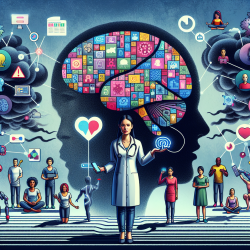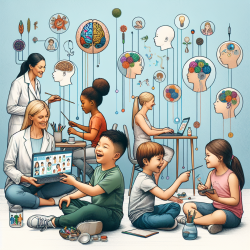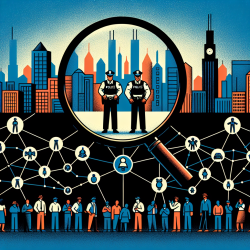Introduction
In the rapidly evolving landscape of digital health, understanding how technology can be effectively integrated into mental health care is crucial. The research article "Cross-cultural and global uses of a digital mental health app: results of focus groups with clinicians, patients, and family members in India and the United States" provides valuable insights into this integration. This blog aims to highlight key findings from the study and discuss how practitioners can leverage these insights to enhance their skills and improve outcomes for children and other patients.
Understanding the Study
The study focused on the co-design of a digital mental health platform, mindLAMP, involving stakeholders from distinct cultural contexts in the United States and India. The research utilized focus groups to gather feedback from clinicians, patients with schizophrenia, and their family members. The study aimed to explore the potential of digital tools in mental health care, particularly in enhancing engagement and trust, which are pivotal for effective treatment.
Key Findings
- Increased Technology Use During COVID-19: The pandemic has accelerated the adoption of digital tools in mental health care. Both clinicians and patients expressed a heightened interest in technology as a means to continue therapy during lockdowns.
- Concerns Over Data Use and Privacy: While there is a willingness to use digital tools, concerns about data privacy and how information is shared remain significant. Ensuring secure data handling is essential to building trust.
- Desire for Human Interaction: Despite the potential of digital tools, both patients and clinicians emphasized the need for these tools to complement, not replace, human interaction in therapy.
Implications for Practitioners
Practitioners can draw several lessons from this study to enhance their practice:
- Embrace Technology: With the increased acceptance of digital tools, practitioners should explore integrating apps like mindLAMP into their therapeutic practices to enhance patient engagement and provide additional insights through data.
- Focus on Data Security: Addressing privacy concerns by ensuring robust data protection measures can help build trust with patients, making them more likely to engage with digital tools.
- Maintain Human Connection: Use digital tools to supplement rather than replace face-to-face interactions. This approach can help maintain the therapeutic alliance, which is critical for effective treatment.
Encouraging Further Research
While the study provides valuable insights, it also highlights the need for further research to explore how digital tools can be tailored to different cultural contexts and specific patient needs. Practitioners are encouraged to engage in or support research efforts that aim to refine digital health solutions, ensuring they are both culturally relevant and clinically effective.
Conclusion
The integration of digital tools into mental health care presents both opportunities and challenges. By leveraging insights from studies like this, practitioners can enhance their skills and improve patient outcomes. Embracing technology, ensuring data security, and maintaining human connections are key strategies for success. To read the original research paper, please follow this link: Cross cultural and global uses of a digital mental health app: results of focus groups with clinicians, patients and family members in India and the United States.










